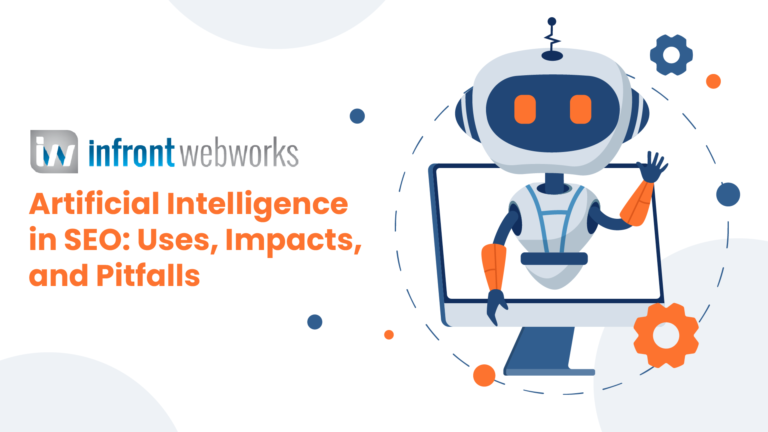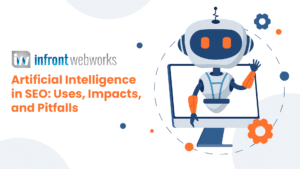Artificial intelligence (AI) is transforming almost every industry, including content marketing and search engine optimization (SEO).
A 2021 report by the American Marketing Association in New York found that nearly 80% of U.S. marketers planned to use AI assistants going forward — a 28% increase from 2019.
AI-powered tools are the future of SEO. They have been used to:
- Find keyword opportunities.
- Produce more SEO content.
- Scale and automate digital marketing activities.
- Improve search rankings for new and existing topics.
In this article, we’ll learn about artificial intelligence in SEO and its uses, impacts, and pitfalls.
Table of Contents
What Is Artificial Intelligence in SEO?
Artificial intelligence (AI) in SEO refers to using different technologies — such as machine learning, natural language processing (NLP), and image recognition — to enable machines to optimize for search engines.
AI enhances search engine performance by looking for data patterns and making predictions. What differentiates it from other software (and makes it intelligent) is its ability to improve performance by learning from past outcomes.
Benefits of Artificial Intelligence in SEO
Why use artificial intelligence in SEO? According to Deloitte’s 2022 State of the AI report, AI increases job satisfaction and enhances performance.
Specifically, here are a few benefits of using AI in SEO:
- AI tools take over the tedious parts of SEO, increasing productivity and efficiency. Many SEO tasks are repeatable and automatable, like link building.
According to a 2022 Morningscore study, more than half of SEOs found link building the most time-consuming SEO task. But AI tools like LinkHunter can automate the task for you.
- AI supplements your content efforts. AI can help you spot content gaps, find relevant keywords to rank for, and even improve your writing.
- AI improves website performance. AI helps with website audits and technical SEO and can alert you when your website performs less optimally than usual.
How To Use AI for SEO
- Keyword research
- Competitor analysis
- Content creation
- Forecasting
- SEO analysis
- Website optimization
1. Keyword Research
Keyword research and keyword mapping are pillars of a solid SEO strategy.
Choosing keywords to optimize for requires large amounts of keyword data. Google processes 3.5 billion searches daily. According to Google itself, 15% of all search queries are new.
Content is produced rapidly, so you need a solid content strategy to stay competitive. Keyword research isn’t as easy as choosing a target keyword and calling it a day.
You need to consider multiple factors, such as domain authority, ranking difficulty, search volume, and whether the keyword fits the user intent.
Nowadays, instead of choosing a single keyword to optimize for, most SEOs create keyword clusters — groups of keywords representing a single search intent.
For example, the keywords “coffee maker,” “drip coffee maker,” and “coffee machine” represent people looking to buy a coffee maker.
If you’re selling coffee makers, you limit your store by only trying to rank for one of these keywords. Creating a keyword cluster that includes primary and several long-tail keywords allows you to rank for more keywords.
AI helps create keyword clusters through keyword extraction.
With keyword extraction, an AI tool shows the most common keywords in the text at the top of the search engine results pages (SERPs).
With this information, AI tools can determine:
- Real-time keyword metrics, such as search volume, cost per click, and keyword difficulty.
- Semantic terms, or related keywords, to help with keyword clustering.
- Autocompletes, similar to Google’s “autocomplete” function, suggest related topics and relevant subtopics.
- Common questions, or related queries that people often ask. They appear on SERP enhancements like featured snippets or the “people also ask” box.
For example, Writesonic has a free keyword extraction tool. Paste your competitors’ text in the box to determine the keywords they’re ranking for.
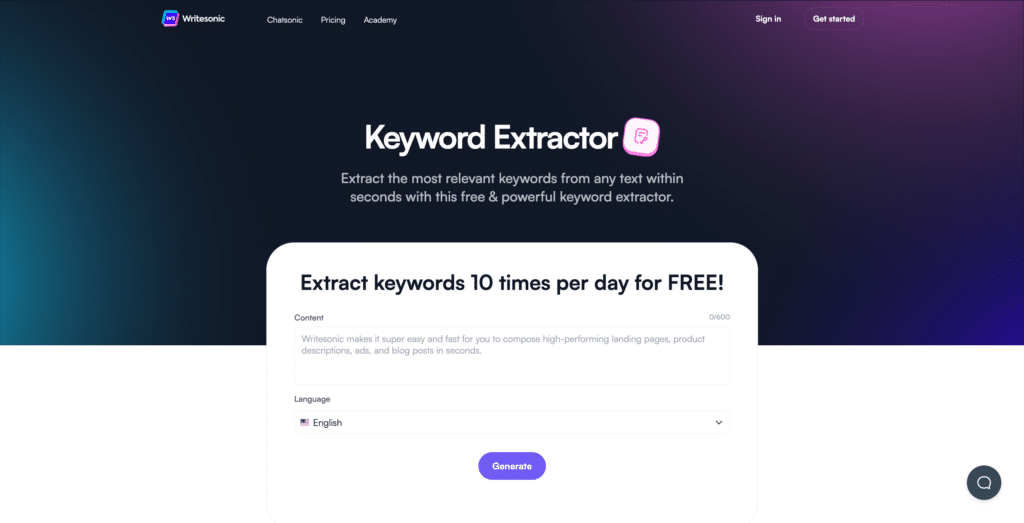
Once you have a list of keywords, a tool like SEO Scout can help you group your keywords into clusters.
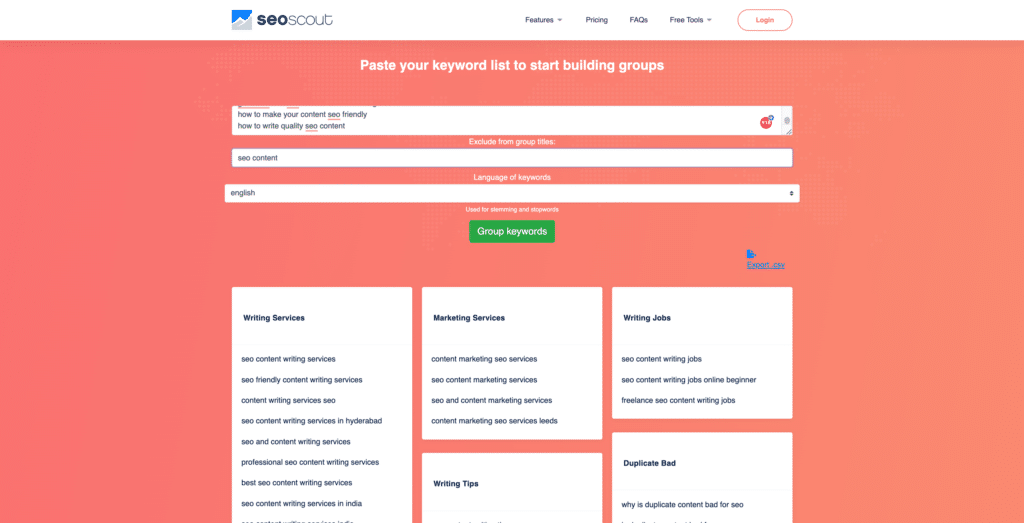
2. Competitor Analysis
Competitor analysis (or competitor research) is evaluating the strengths and weaknesses of your and your competitor’s SEO. You use this information to improve your website’s SEO.
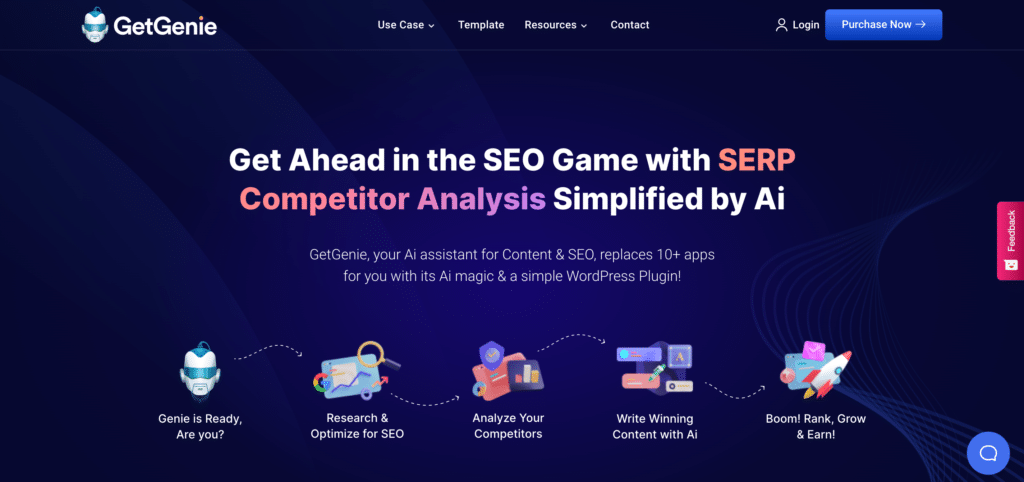
An AI-powered competitive analysis tool like GetGenie helps you benchmark your performance against competitors and reveal their strengths, gaps, and weaknesses.
3. Content Creation
Good content takes time to develop. But AI is there to help with issues like duplicate content, increasing content demands, and writer’s block.
Here are a few ways AI supplements your content efforts:
Paraphrasing
Google penalizes plagiarized and duplicate content that goes against its spam guidelines. That’s why writers must think of multiple ways to convey the same thought.
But writers can encounter writer’s block, which isn’t ideal when there’s a looming deadline.
That’s where AI comes in. AI-powered tools like Wordtune don’t get stuck. They help you paraphrase sentences so you don’t commit plagiarism.
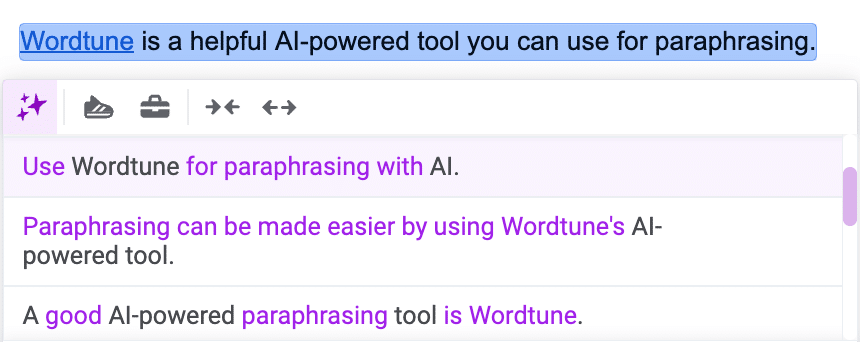
Scaling Content Production
AI speeds up content production. Use it to create outlines, repurpose content, and write blurbs and short descriptions.
You can use AI to write short captions for mediums that aren’t particular about originality, like social media.
For example, use Rytr to generate social media ad copy or Frase to create content briefs and outlines.
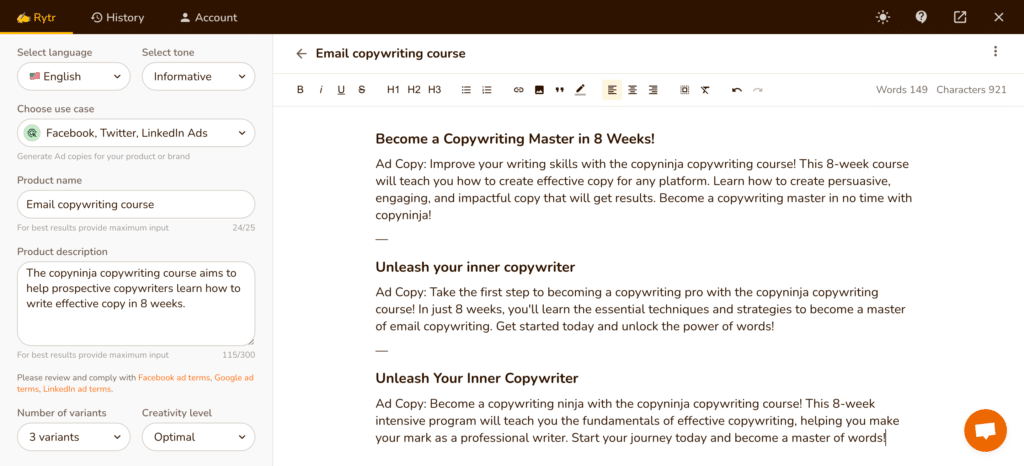
Remember, AI tools give you something to work with, but you can’t rely on them solely to write something of value and expertise — heavy editing is required.
Generating Ideas
Need ideas? You can use AI SEO tools like Copy AI’s Blog Idea Generator to brainstorm topics or find common themes when you’re stuck.
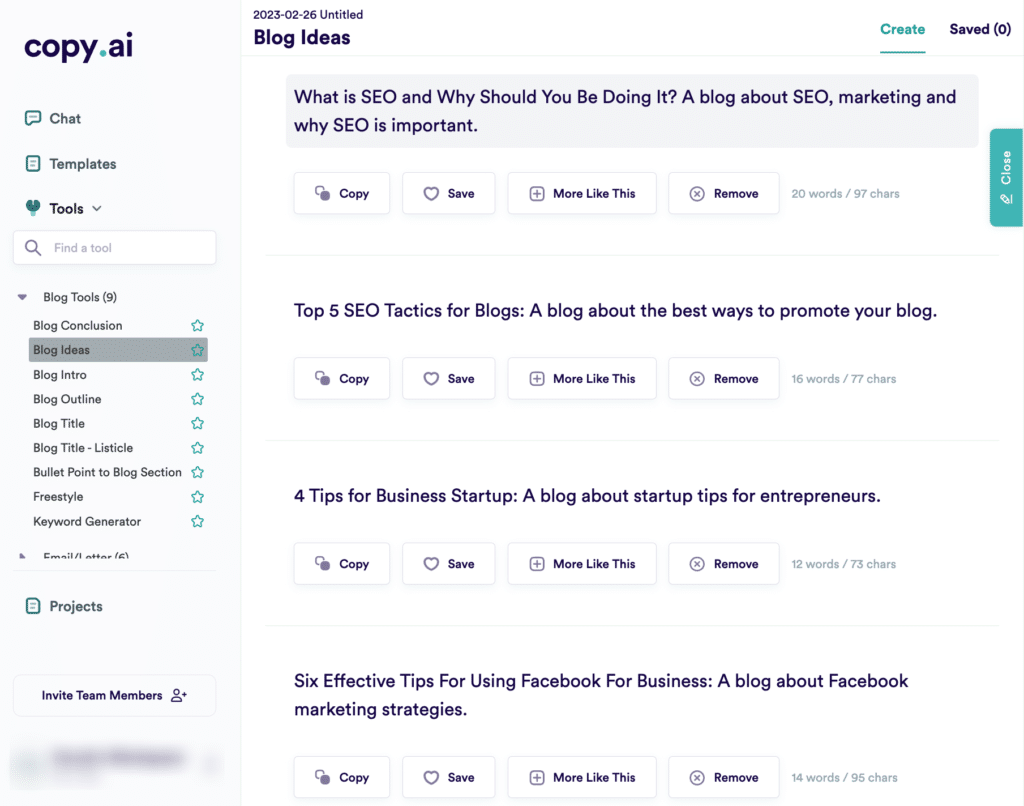
Optimizing content
Need an extra set of eyes? AI-powered tools like Grammarly and Hemingway check whether your writing is on-point. Originality AI detects plagiarism and AI-generated content.
Many AI SEO content tools also have a meta description writing feature. Leaving AI to write metadata is fine because only the search engine crawlers read those descriptions. Leveraging AI to write metadata is the perfect case of letting the machine write for the machine.
Less than 1% of online content is generated using AI. We predict that at least 50% of online content will be generated by or augmented by AI in the next 🔟 years.
— Bessemer (@BessemerVP) July 7, 2022
Read more from @bhavikvnagda, @LucyPless, and @TaliaGold on the future of generative AI 👇https://t.co/2EeTLgYflW
4. Forecasting
Using AI in SEO allows you to predict rankings and algorithm changes.
AI uses predictive analytics based on algorithmic data to create a model showing minor optimizations’ effects. For example, Market Brew’s AI SEO tool can model algorithm changes, so you can see where your website appears on the SERPs after an update.
Market Brew recalibrates its search engine models when Google rolls out another algorithm update.
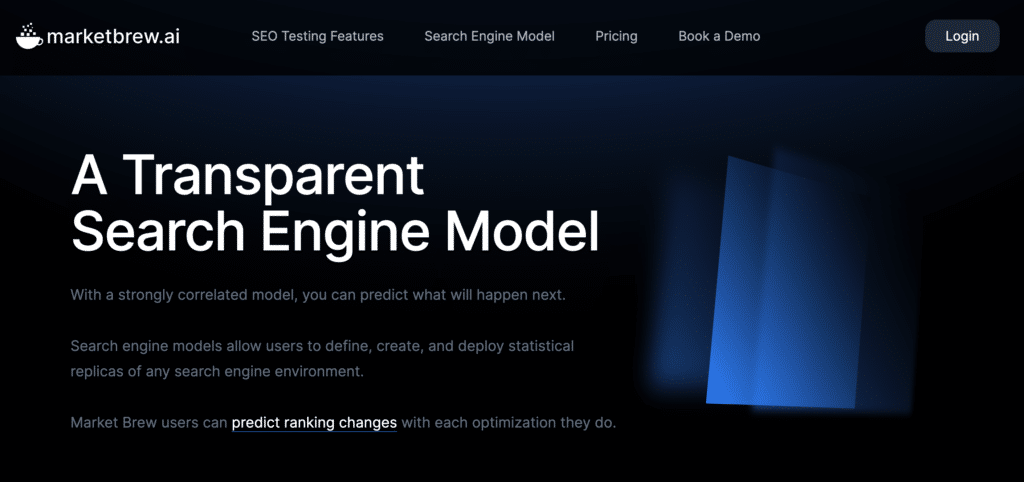
5. SEO Analysis
An SEO analysis (or SEO audit) evaluates whether your website follows search engine best practices. You need to perform audits periodically because Google’s algorithm keeps changing.
During audits, researchers provide an initial SEO report to detail the website’s status. They monitor keyword performance, backlinks, and more — all of which AI can automate. Once SEOs have data, they make recommendations for improvements.
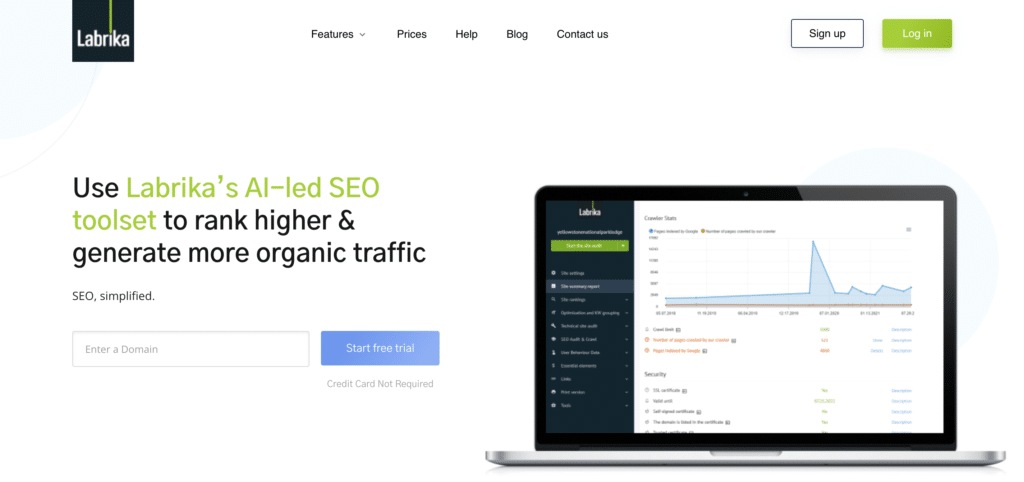
Labrika is an example of an AI SEO analysis tool. It checks over 200 ranking factors and shares its findings in a report.
6. Website Optimization
Another AI in SEO use case is website optimization.
A website that adheres to holistic SEO covers content and technical SEO aspects.
Technical SEO ensures search engine crawlers find and index content quickly. It can also involve tasks that enhance user experience (UX), such as improving website speed, mobile responsiveness, and security.
AI technologies like WordLift and Botify take care of your website’s backend. They automatically create sitemaps and structured data. They also optimize internal linking and other on-page-related factors.
Pitfalls of Using AI in SEO
Technology can automate, optimize, and improve processes, but it isn’t perfect. Here are a few reasons to be careful when using AI in SEO:
Inaccurate Information
Using AI for content writing is possible because AI pieces strings of words together after “reading” or “observing” millions of texts. But it doesn’t know the context or meaning of these text strings, so you still need humans to double-check the accuracy.
Not Always SEO Friendly
Ironically, although AI can help SEO, it’s not always SEO-friendly. Google can detect auto-generated content and penalize websites for violating its spam guidelines.
Google has safeguards in place to guard against AI-generated content. It uses human quality raters to qualify whether a piece of content accurately answers a question or provides a good UX.
Google updated its search engine algorithm in 2022 to prioritize helpful content — pieces that offer a unique viewpoint and speak from experience.
Will AI in SEO Replace Humans?
For all the advantages and disadvantages of artificial intelligence in SEO, the question remains: Will AI replace humans?
The question has always been around, but the release of ChatGPT in November 2022 had everyone buzzing.
ChatGPT is an AI-powered chatbot developed by OpenAI that can even mimic human writing.
ChatGPT by @OpenAI does really well with coding questions. Here I ask how to build a 3-column footer with Tailwind. I then follow-up and ask for a React version, more realistic copy, and mobile responsiveness. It nails it perfectly. pic.twitter.com/lhhH9FHpld
— Gabe 🎣 (@gabe_ragland) November 30, 2022
OK so @OpenAI's new #ChatGPT can basically just generate #AIart prompts. I asked a one-line question, and typed the answers verbatim straight into MidJourney and boom. Times are getting weird...🤯 pic.twitter.com/sYwdscUxxf
— Guy Parsons (@GuyP) November 30, 2022
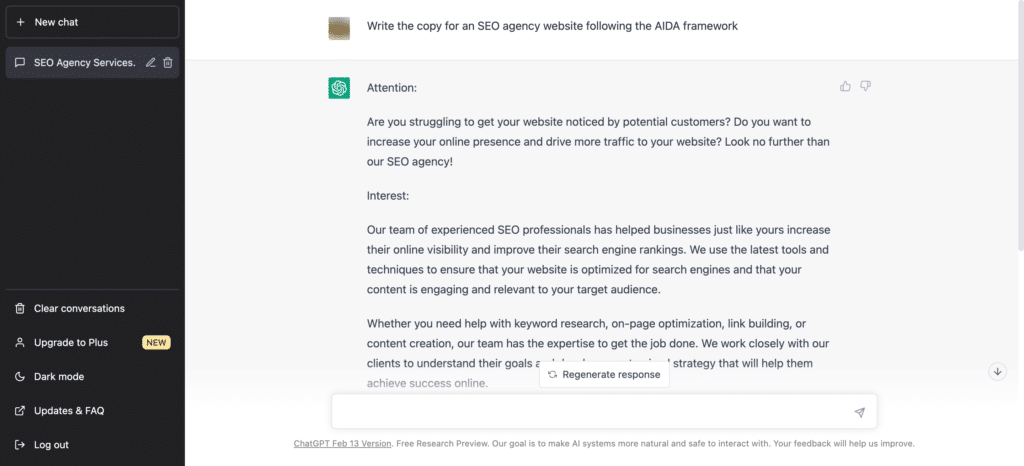
After several tests, the consensus is that you shouldn’t worry about AI taking over humans anytime soon — at least when it comes to creating quality content.
AI can’t perform or replicate certain aspects of content creation.
For instance, AI is impersonal. It can’t understand human sentiments, which makes it hard to emulate human writing.
AI lacks authenticity, expertise, and certain nuances in human language. It can’t write personal narratives or recall memories and experiences. It can only write information gathered from data banks.
You still need a human component to bring:
- Original research
- Data storytelling and synthesis
- New viewpoints and counter opinions
Bottom Line: AI can only mimic human language patterns. It can’t make an original thought.
Final Thoughts: Artificial Intelligence in SEO — Is AI Required for Success?
With continued technological advancements, the use of AI in SEO has become more accessible.
AI can automate many SEO functions, analyze billions of data, and predict future performance — solving problems and saving time.
Because AI is so powerful, there are concerns about it replacing humans. But at the moment, AI can’t function as a standalone solution for SEO.
It’s only a tool to supplement your SEO efforts. You still need human expertise to interpret data and create an SEO strategy.
For SEO help and expertise, contact Infront today.
FAQ's About Artificial Intelligence in SEO
Artificial intelligence in SEO refers to the integration of AI technologies and techniques to improve search engine optimization strategies. It involves using machine learning algorithms and natural language processing to enhance various aspects of SEO, such as keyword research, content optimization, link building, and website analysis.
AI in SEO can be used for various purposes, including:
- Content optimization: AI algorithms can analyze content and provide suggestions for improving its relevance, readability, and search engine friendliness.
- Keyword research: AI tools can identify relevant keywords and long-tail phrases based on search patterns and user intent, helping to optimize content for better visibility.
- Voice search optimization: AI can assist in optimizing websites for voice search queries, considering the different search behaviors and algorithms associated with voice-based searches.
- User experience improvement: AI can analyze user behavior, preferences, and engagement metrics to provide insights for enhancing user experience on websites.
- Automated reporting and analysis: AI-powered tools can automate data analysis, generate reports, and provide actionable insights for SEO professionals.
- Natural language processing: AI can help understand and interpret user queries better, aiding in creating more relevant and context-aware content.
The impacts of AI on SEO are numerous and diverse. Some notable impacts include:
- Enhanced search results: AI algorithms, such as Google’s RankBrain, can improve search engine result page (SERP) quality by understanding user intent and delivering more relevant and personalized results.
- Improved user experience: AI-powered chatbots, voice assistants, and recommendation systems can enhance user engagement, satisfaction, and overall website experience.
- Efficient data analysis: AI algorithms can process vast amounts of data quickly, enabling SEO professionals to identify patterns, trends, and insights that can inform decision-making and optimization strategies.
- Automation of repetitive tasks: AI can automate repetitive SEO tasks, such as keyword research, content analysis, and backlink monitoring, freeing up time for SEO experts to focus on higher-level strategies.
- Better content optimization: AI tools can provide suggestions and recommendations to optimize content for search engines and users, leading to improved visibility and relevance.
- Real-time monitoring and adaptability: AI-powered tools can monitor search engine algorithms and rankings in real-time, allowing SEO professionals to quickly adapt and optimize their strategies accordingly.
While AI offers significant benefits, there are also some potential pitfalls and challenges to be aware of:
- Lack of transparency: AI algorithms can sometimes be complex and opaque, making it difficult to understand the exact factors that influence rankings or results.
- Bias in algorithms: AI algorithms can inadvertently reflect biases present in training data, leading to biased search results or skewed optimization recommendations.
- Overreliance on automation: Depending too heavily on AI automation without human oversight can lead to missed opportunities or inappropriate strategies.
- Privacy concerns: AI-powered SEO tools may require access to user data, raising privacy concerns that need to be carefully addressed and managed.
- Constant evolution: AI technologies and search engine algorithms are constantly evolving, requiring SEO professionals to stay updated and adapt their strategies accordingly.
- Skill requirements: Utilizing AI in SEO may require additional skills and knowledge to effectively leverage AI tools and interpret their outputs.
- Stay updated: Keep abreast of the latest AI technologies, SEO trends, and algorithm changes to optimize strategies accordingly.
- Choose reliable AI tools: Research and select reputable AItools that align with your SEO goals and provide reliable and accurate insights.
- Combine AI with human expertise: While AI can automate tasks, it’s important to leverage human expertise to interpret the AI-generated insights and make informed decisions.
- Test and measure results: Implement AI-powered SEO strategies in controlled environments, test their effectiveness, and measure the impact on key performance indicators (KPIs).
- Address bias and ethical considerations: Regularly evaluate AI algorithms for any biases and ensure ethical practices in data collection and usage.
- Embrace continuous learning: Encourage SEO professionals to enhance their skills in AI and stay updated with industry developments to leverage AI’s full potential in SEO.

Matthew is the President of Infront Webworks and is a New England native now calling Colorado Springs home. Matt attended The University of NH where he pursued a BS in Natural Resource Economics & Business Administration. Aside from Infront; Matthew has owned and managed two other online agencies based on the seacoast of New Hampshire and been a key player in multiple technology mergers & acquisitions. When he’s not bathing in technology, online marketing & business; he’s probably spending time with his wife and daughter, boating, skiing the trees, hiking or cooking..he is a foodie for sure!

